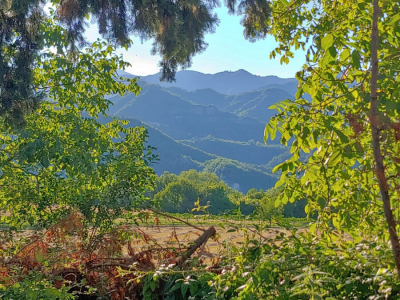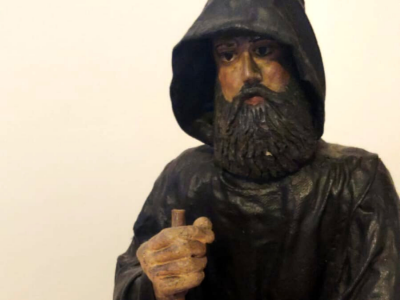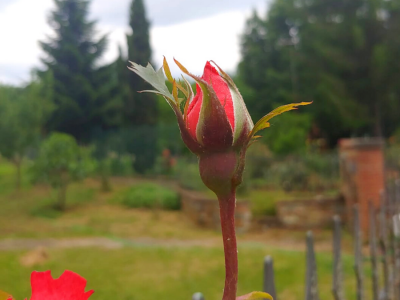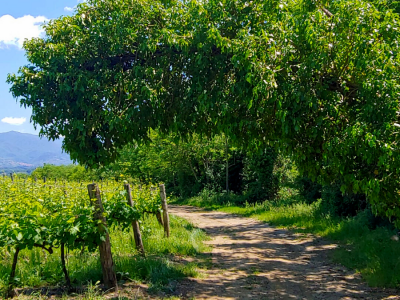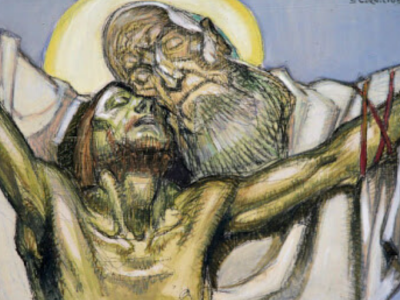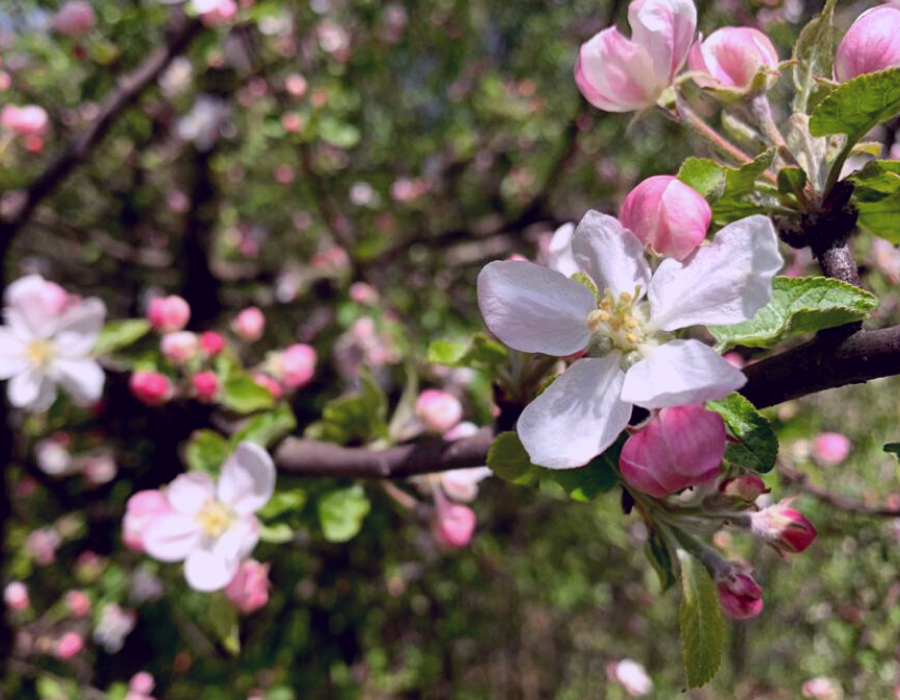stdClass Object
(
[id] => 16131
[title] => Hence, God resembles me
[alias] => hence-god-resembles-me
[introtext] => The soul and the harp/17 - We are not loved because we are without fault but because we are loved-and-that's-it
by Luigino Bruni
Published in Avvenire 19/07/2020
"It is not our job to predict the day - but that day will come - when men will be called again to pronounce the word of God in such a way that the world will be changed and renewed. It will be a new language, perhaps a completely non-religious one".
Dietrich Bonhoeffer, Reality and resistance
The culture of guilt and sacrifice hides many pitfalls, some well known to the Bible, which reveals them to us in Psalm 51 (and in the one that precedes it) one of the best-known and most beautiful psalm there are.
«Have mercy on me, O God, according to your unfailing love; according to your great compassion blot out my transgressions. Wash away all my iniquity and cleanse me from my sin. For I know my transgressions, and my sin is always before me» (Psalm 51,1-3). Miserere mei, Deus. Words sung in all languages, generation after generation, bedside after bedside, tear after tear, despair after despair, hope after hope. Perhaps there is no psalm more loved than the Miserere, more loved by the people, and by the poor. Not everyone is persecuted, not everyone recognizes the Creator's imprint in the starry sky, and so those psalms written and offered for these circumstances remain silent; but there is no man or woman who has not felt an invincible need to be forgiven at least once in his or her life - if only in his or her last moment. Homo sapiens is an animal begging for forgiveness.
[fulltext] => In this commentary on the Book of Psalms, we generally do not mention the first verse of the song, where the editorial title is found, which provides information on the author and the historical context, also because it does not always help to follow the good exegetical path. When it comes to Psalm 51, however, the title is very important: "A psalm of David. When the prophet Nathan came to him after David had committed adultery with Bathsheba" (Psalm 51). It is the same open wound of the Old Testament, the black hole in the history of salvation, the painful pause within the genealogy of Jesus: «David was the father of Solomon, whose mother had been Uriah’s wife» (Matthew 1,6). The murder of Uriah the Hittite, the faithful and loyal soldier that David had assassinated, the blood name of a non-father, ringed, like opaque pearls, in that rosary that we have been reciting for two millennia every Christmas.
Nathan the prophet was sent by God to King David to reveal the seriousness of his sin (2 Samuel 12.1). And after having told him the parable of the sheep and having obtained the indignation of the king for the crime committed by the rich man in the story, that prophet pronounced one of the most terrible sentences in the Bible: «You are the man!» (2 Samuel 12,7). David did not curse Nathan, but recognized his crime and recited his miserere: «I have sinned against the Lord» (2 Samuel 12,13). The Psalm continues the prayer where Samuel's second book had interrupted it: «Against you, you only, have I sinned and done what is evil in your sight» (Psalm 51,4). David is also great for his miserere, as great as his sin.
We find ourselves in front of one of the pages that invented the ethics of guilt. It is not the only page (there are other immense ones in Greek myths as well), but the words on David's sin and how this is managed are among the first words to be written in the great speech on guilt, which has been added to the more archaic, and still very much alive, one of the ethics of shame. In guilt, it is the gaze of God that sees us in secret and denounces our crime; in shame, it is the gaze of others that discovers us, condemns us and punishes us. The transition from shame to guilt (never fully accomplished and clear) represented, in many respects, an ethical leap in civilization and religions, but the ethics of guilt also knows a fair share of pathologies and has produced and still produces its own kind of damage.
The culture of guilt is at the origin of serious forms of slavery, not only psychological or spiritual. It has prevented too many people from experiencing freedom and liberation because they remain nailed in everlasting feelings of guilt, almost always invented or amplified. This happened and happens when the experience of guilt is not preceded and accompanied by the most foundational experience of being loved and therefore freed from our feelings of guilt, freed from the certainty that we are not loved because we are without fault but loved-and-that-is-it. The certainty that we are first born innocent and then guilty, that no fault can erase the image of God, Adam's inheritance, because Cain killed Abel, but not his resemblance to God. Because if it is true, as David reminds us, that «Surely I was sinful at birth, sinful from the time my mother conceived me» (Psalm 51,5), the prophets remind us that first of all we are loved: «Before I formed you in the womb, I knew you» (Jeremiah 1,5). The culture of guilt is very dangerous because it obscures this priority of love, because it takes away the joy ("let me hear joy and gladness" (Psalm 51,8), it blocks us inside our demerits, it narcissistically concentrates us on our moral navel and does not enable us to see the free beauty that is all around us.
Psalms 50 and 51 deal with a specific pathology of the culture of guilt. The one contained in the logic of sacrifice. There is a very close relationship between guilt and sacrifice. Sins were considered to be committed against others, hence sin generated a sense of guilt in the person in question and the community as a whole, which needed to be appeased with sacrifices offered to God. Therefore, the sense of guilt was generated by injustices in horizontal inter-human relationships, but repairing the damage occurred in a vertical relationship between man and divinity. The Bible here denounces the perversion of this horizontal fault / vertical repair mechanism: «I am God… Do I eat the flesh of bulls or drink the blood of goats?» (Psalm 50,13); «You do not delight in sacrifice, or I would bring it; you do not take pleasure in burnt offerings» (Psalm 51,16). Sin, in the Bible, is never a private matter between oneself and divinity: it is instead a "public evil", which always produces "negative externalities" on others, of which I must take charge if repentance is to be responsible. The psalmist reminds us, together with the prophets, that one cannot violate the justice of one's neighbor and then hope to repair in the context of religious worship: «What right have you to recite my laws or take my covenant on your lips? You hate my instruction and cast my words behind you. When you see a thief, you join with him; you throw in your lot with adulterers. You use your mouth for evil and harness your tongue to deceit. You sit and testify against your brother and slander your own mother’s son» (Psalm 50,16-20). These gifts-sacrifices are then only bribes offered to God, mafia gifts that only idols would accept: «ll-gotten goods offered in sacrifice are tainted… So one who fasts for sins, but goes and commits them again: Who will hear his prayer?» (Sirach 34,31).
We find ourselves facing ancient temptation, sometimes favored by religions, to believe that the damage done to one's neighbor can be "repaid" to God in a sophisticated market of indulgence. The reason for this sick relationship is simple: if sacrifice is the price of my sin, religion becomes a market for cattle where permission to sin can be bought. Temples thus become offices of perpetual amnesties, which in the end do nothing but encourage sins – in part, because our sins thus become resources for the temple. It is an infantile idea of ??God and religion, never extinguished in the heart of religions. Here then is the different solution indicated by the Psalm in the song of David repented: «My sacrifice, O God, is[b] a broken spirit; a broken and contrite heart you, God, will not despise» (Psalm 51,17), because «The repentance that immolates me this is my glory» (Psalm 50,23). The psalmist here removes his economic-remunerative-compensatory logic from sacrifice, and makes it an expression of praise, a prayer of supplication for conversion: «Create in me a pure heart, O God, and renew a steadfast spirit within me» (Psalm 51,12).
An innovation of spirituality. If I have committed a sin, if I have violated justice, it is not possible to compensate for the damage done to the persons in question with a sacrifice to God. However, there is a sincere act that I can do: ask God for a "new heart", and therefore to promise conversion, to commit myself not to commit that crime again - and perhaps to repair the damage I have done, but this psalm does not say so. The wisest attitude, the best economy of repentance is the one that looks to the future, not the one that looks to the past: if there is salvation from any past, it is the one that sets up its tent in the future.
We have learned over the millennia that not even the request of a new heart, not even the "sacrifice of praise" offers guarantees that I will no longer commit that sin which I now "confess" to before God. The psalmist, however, wanted to eliminate the "stock exchange" of sins where all our "moral promissory notes" could be discounted. In reality, even if the sacrifices of bulls and lambs ended up as part of our culture, the temptation to make religion a place of vertical compensation for sins and damages for which we do not want to take horizontal responsibility for true compensation has never stopped. Stock exchanges and clearing houses have changed in form, but not in substance, they have left the realms of religion and churches, but the temptation to "defile a brother", to violate justice and what is right and then wait for some form of amnesty or amnesty to wash our sin away with a counter offer has always remained too strong. And the psalms keep repeating to us, on behalf of God: «When you did these things and I kept silent, you thought I was exactly like you?» (Psalm 50,21).
And yet, dear old psalmist friend, we "truly resemble" that God who reproaches us through you. That same Bible that hosts your song told us: «So God created mankind on his own image» (Genesis 1,27). We do not "resemble" anything strange. Each image is a relationship of reciprocity, and if we are the image of God, God is also our image. We are fully aware that we humans are a web of vices and virtues, of beauty and sins, of faithfulness and betrayals, that we are all brothers of Abel and Cain, all sisters, sons and daughters of Ruth and Jezebel. All images of Elohim, we all look like him. Then, someone could ask the Bible uncomfortable questions: why should we protect the image from the shadows and save only the light? Why reduce and cut out that verse to enable ourselves only the resemblance our good part? What if ethics were not the right criterion for making this cut? What iff God was greater than our virtues? What if we looked more like him than we think? What if we, too, are greater than our hearts?
[checked_out] => 0
[checked_out_time] => 0000-00-00 00:00:00
[catid] => 1007
[created] => 2020-07-18 23:17:55
[created_by] => 4501
[created_by_alias] => Luigino Bruni
[state] => 1
[modified] => 2020-08-23 18:34:14
[modified_by] => 609
[modified_by_name] => Super User
[publish_up] => 2020-07-27 08:48:12
[publish_down] => 0000-00-00 00:00:00
[images] => {"image_intro":"","float_intro":"","image_intro_alt":"","image_intro_caption":"","image_fulltext":"","float_fulltext":"","image_fulltext_alt":"","image_fulltext_caption":""}
[urls] => {"urla":false,"urlatext":"","targeta":"","urlb":false,"urlbtext":"","targetb":"","urlc":false,"urlctext":"","targetc":""}
[attribs] => {"article_layout":"","show_title":"","link_titles":"","show_tags":"","show_intro":"","info_block_position":"","info_block_show_title":"","show_category":"","link_category":"","show_parent_category":"","link_parent_category":"","show_associations":"","show_author":"","link_author":"","show_create_date":"","show_modify_date":"","show_publish_date":"","show_item_navigation":"","show_icons":"","show_print_icon":"","show_email_icon":"","show_vote":"","show_hits":"","show_noauth":"","urls_position":"","alternative_readmore":"","article_page_title":"","show_publishing_options":"","show_article_options":"","show_urls_images_backend":"","show_urls_images_frontend":"","helix_ultimate_image":"images\/2020\/07\/18\/L'anima-e-la-cetra-17.png","helix_ultimate_image_alt_txt":"","helix_ultimate_article_format":"standard","gallery":"","helix_ultimate_audio":"","helix_ultimate_video":"","link_title":"","link_url":"","quote_text":"","quote_author":"","post_status":""}
[metadata] => {"robots":"","author":"","rights":"","xreference":""}
[metakey] =>
[metadesc] =>
[access] => 1
[hits] => 1303
[xreference] =>
[featured] => 1
[language] => en-GB
[on_img_default] =>
[readmore] => 9887
[ordering] => 77
[category_title] => EN - The soul and the harp
[category_route] => commenti-biblici/serie-bibliche/it-l-anima-e-la-cetra
[category_access] => 1
[category_alias] => en-the-soul-and-the-harp
[published] => 1
[parents_published] => 1
[lft] => 135
[author] => Luigino Bruni
[author_email] => lourdes.hercules.91@gmail.com
[parent_title] => IT - Serie bibliche
[parent_id] => 773
[parent_route] => commenti-biblici/serie-bibliche
[parent_alias] => serie-bibliche
[rating] => 0
[rating_count] => 0
[alternative_readmore] =>
[layout] =>
[params] => Joomla\Registry\Registry Object
(
[data:protected] => stdClass Object
(
[article_layout] => _:default
[show_title] => 1
[link_titles] => 1
[show_intro] => 1
[info_block_position] => 0
[info_block_show_title] => 1
[show_category] => 1
[link_category] => 1
[show_parent_category] => 1
[link_parent_category] => 1
[show_associations] => 0
[flags] => 1
[show_author] => 0
[link_author] => 0
[show_create_date] => 1
[show_modify_date] => 0
[show_publish_date] => 1
[show_item_navigation] => 1
[show_vote] => 0
[show_readmore] => 0
[show_readmore_title] => 0
[readmore_limit] => 100
[show_tags] => 1
[show_icons] => 1
[show_print_icon] => 1
[show_email_icon] => 1
[show_hits] => 0
[record_hits] => 1
[show_noauth] => 0
[urls_position] => 1
[captcha] =>
[show_publishing_options] => 1
[show_article_options] => 1
[save_history] => 1
[history_limit] => 10
[show_urls_images_frontend] => 0
[show_urls_images_backend] => 1
[targeta] => 0
[targetb] => 0
[targetc] => 0
[float_intro] => left
[float_fulltext] => left
[category_layout] => _:blog
[show_category_heading_title_text] => 0
[show_category_title] => 0
[show_description] => 0
[show_description_image] => 0
[maxLevel] => 0
[show_empty_categories] => 0
[show_no_articles] => 1
[show_subcat_desc] => 0
[show_cat_num_articles] => 0
[show_cat_tags] => 1
[show_base_description] => 1
[maxLevelcat] => -1
[show_empty_categories_cat] => 0
[show_subcat_desc_cat] => 0
[show_cat_num_articles_cat] => 0
[num_leading_articles] => 0
[num_intro_articles] => 14
[num_columns] => 2
[num_links] => 0
[multi_column_order] => 1
[show_subcategory_content] => -1
[show_pagination_limit] => 1
[filter_field] => hide
[show_headings] => 1
[list_show_date] => 0
[date_format] =>
[list_show_hits] => 1
[list_show_author] => 1
[list_show_votes] => 0
[list_show_ratings] => 0
[orderby_pri] => none
[orderby_sec] => rdate
[order_date] => published
[show_pagination] => 2
[show_pagination_results] => 1
[show_featured] => show
[show_feed_link] => 1
[feed_summary] => 0
[feed_show_readmore] => 0
[sef_advanced] => 1
[sef_ids] => 1
[custom_fields_enable] => 1
[show_page_heading] => 0
[layout_type] => blog
[menu_text] => 1
[menu_show] => 1
[secure] => 0
[helixultimatemenulayout] => {"width":600,"menualign":"right","megamenu":0,"showtitle":1,"faicon":"","customclass":"","dropdown":"right","badge":"","badge_position":"","badge_bg_color":"","badge_text_color":"","layout":[]}
[helixultimate_enable_page_title] => 1
[helixultimate_page_title_alt] => The soul and the harp
[helixultimate_page_subtitle] => Biblical Commentaries
[helixultimate_page_title_heading] => h2
[page_title] => The soul and the harp
[page_description] =>
[page_rights] =>
[robots] =>
[access-view] => 1
)
[initialized:protected] => 1
[separator] => .
)
[displayDate] => 2020-07-18 23:17:55
[tags] => Joomla\CMS\Helper\TagsHelper Object
(
[tagsChanged:protected] =>
[replaceTags:protected] =>
[typeAlias] =>
[itemTags] => Array
(
[0] => stdClass Object
(
[tag_id] => 25
[id] => 25
[parent_id] => 1
[lft] => 47
[rgt] => 48
[level] => 1
[path] => l-anima-e-la-cetra
[title] => L'anima e la cetra
[alias] => l-anima-e-la-cetra
[note] =>
[description] =>
[published] => 1
[checked_out] => 0
[checked_out_time] => 0000-00-00 00:00:00
[access] => 1
[params] => {}
[metadesc] =>
[metakey] =>
[metadata] => {}
[created_user_id] => 609
[created_time] => 2020-03-27 18:25:19
[created_by_alias] =>
[modified_user_id] => 0
[modified_time] => 2020-08-01 12:25:36
[images] => {}
[urls] => {}
[hits] => 15629
[language] => *
[version] => 1
[publish_up] => 2020-03-27 18:25:19
[publish_down] => 2020-03-27 18:25:19
)
)
)
[slug] => 16131:hence-god-resembles-me
[parent_slug] => 773:serie-bibliche
[catslug] => 1007:en-the-soul-and-the-harp
[event] => stdClass Object
(
[afterDisplayTitle] =>
[beforeDisplayContent] =>
[afterDisplayContent] =>
)
[text] => The soul and the harp/17 - We are not loved because we are without fault but because we are loved-and-that's-it
by Luigino Bruni
Published in Avvenire 19/07/2020
"It is not our job to predict the day - but that day will come - when men will be called again to pronounce the word of God in such a way that the world will be changed and renewed. It will be a new language, perhaps a completely non-religious one".
Dietrich Bonhoeffer, Reality and resistance
The culture of guilt and sacrifice hides many pitfalls, some well known to the Bible, which reveals them to us in Psalm 51 (and in the one that precedes it) one of the best-known and most beautiful psalm there are.
«Have mercy on me, O God, according to your unfailing love; according to your great compassion blot out my transgressions. Wash away all my iniquity and cleanse me from my sin. For I know my transgressions, and my sin is always before me» (Psalm 51,1-3). Miserere mei, Deus. Words sung in all languages, generation after generation, bedside after bedside, tear after tear, despair after despair, hope after hope. Perhaps there is no psalm more loved than the Miserere, more loved by the people, and by the poor. Not everyone is persecuted, not everyone recognizes the Creator's imprint in the starry sky, and so those psalms written and offered for these circumstances remain silent; but there is no man or woman who has not felt an invincible need to be forgiven at least once in his or her life - if only in his or her last moment. Homo sapiens is an animal begging for forgiveness.
[jcfields] => Array
(
)
[type] => intro
[oddeven] => item-odd
)
